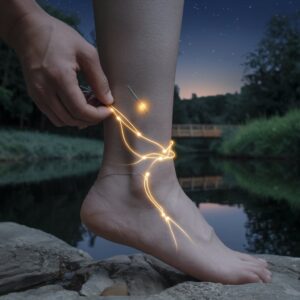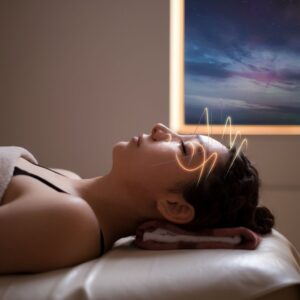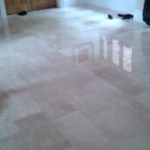Exploring Acupuncture: A Natural Approach to Combat Insomnia
Sleep disorders are on the rise in our modern, fast-paced world, affecting a significant number of individuals worldwide. If you have exhausted all options with over-the-counter drugs or lifestyle modifications to improve your sleep without much success, you might be in search of an alternative solution. Acupuncture for insomnia has become increasingly popular as a natural way to restore sleep equilibrium.
The Ancient Practice of Acupuncture and Its Modern Relevance
Acupuncture is a traditional Chinese medical technique that involves the precise insertion of thin needles into specific points on the body. These points, known as acupuncture points or acupoints, are believed to be interconnected pathways that help facilitate the flow of vital energy, referred to as Qi. By targeting specific acupoints, acupuncture aims to restore the balance of Qi and improve one's overall health.
Acupuncture is rooted in Traditional Chinese Medicine (TCM), which views health as a harmonious equilibrium within the body. This ancient practice has a history of over 2,500 years and has earned global recognition as a respected treatment method. Although abstract, the concept of Qi carries excellent significance in acupuncture. Qi is the essential energy that flows through the body's meridians. When this flow is disrupted, it can result in a range of health problems, including difficulty sleeping.
Modern research has provided compelling evidence supporting the effectiveness of acupuncture, showcasing its ability to stimulate the body's natural healing processes. By stimulating specific points, acupuncture can enhance blood circulation, energise the nervous system, and promote the release of neurotransmitters. Understanding the physiological changes that occur during acupuncture is crucial for fully comprehending its potential in effectively managing sleep disorders. Extensive research has shown that acupuncture has a significant positive effect on sleep quality. It helps to shorten the time it takes to fall asleep and promotes a longer overall sleep duration.
How Acupuncture Helps in Treating Insomnia: A Comprehensive Insight
 Regulating the Sleep-Wake Cycle Naturally
Regulating the Sleep-Wake Cycle Naturally
By leveraging the skills of an experienced acupuncturist, the sleep-wake cycle can be effectively regulated by stimulating endorphins and other neurotransmitters. This technique promotes profound relaxation and enhances the overall sleep experience. Using acupuncture, you can improve your body's energy flow and experience a more tranquil and revitalising sleep.
The sleep-wake cycle, or circadian rhythm, is a vital internal process that governs the natural sleep pattern and wakefulness over 24 hours. Disruptions in this cycle may result in difficulties falling asleep and other sleep-related issues. Acupuncture can influence sleep patterns by targeting specific points, including Shenmen (HT7), Sanyinjiao (SP6), and Anmian.
Located on the wrist, Shenmen, also known as Heart 7, can soothe the mind and relieve anxiety, which is often the underlying cause of insomnia. Situated above the ankle, Sanyinjiao, also known as Spleen 6, is believed to maintain a harmonious state between the liver, spleen, and kidneys. It is said to aid in hormonal balance and stress reduction. Anmian, located behind the ear, plays a crucial role in promoting restful sleep by assisting in falling and staying asleep.
With expert precision, acupuncture effectively stimulates the body's production of melatonin, a crucial hormone that helps regulate sleep patterns. Ensuring optimal melatonin levels can contribute to a well-regulated sleep-wake cycle, improving sleep quality and a rejuvenating morning wake-up.
Reducing Stress and Anxiety Through Acupuncture
Stress and anxiety often cause sleep disruptions. Acupuncture stimulates the parasympathetic nervous system, which can induce a state of relaxation and provide relief from stress. Creating a serene environment that promotes deep relaxation can help you sleep a restful night.
Like an acupuncture expert, the parasympathetic nervous system, also known as the “rest and digest” system, helps conserve energy and facilitates relaxation. Acupuncture effectively targets specific acupoints to help alleviate the body's stress response. Specific points on the body, such as Yintang, Baihui, and Neiguan, have demonstrated remarkable efficacy in relieving anxiety and stress.
Yintang, a commonly used acupuncture point, is well-known for its ability to reduce stress and enhance mental clarity. Baihui, also known as GV20, is renowned for its capacity to induce a sense of calm and harmony in both the mind and body. Neiguan, also known as Pericardium 6, is commonly utilised to alleviate symptoms like anxiety, palpitations, and emotional distress.
By focusing on these specific aspects, the body can naturally release chemicals that enhance mood and induce relaxation. This neurochemical response aids in reducing the heightened state commonly linked to insomnia, facilitating the attainment of peaceful sleep.
 Hormonal Balance: Acupuncture's Role in Regulating Sleep Hormones
Hormonal Balance: Acupuncture's Role in Regulating Sleep Hormones
Hormonal imbalances can cause disrupted sleep patterns. Acupuncture has shown remarkable effectiveness in targeting specific acupoints closely linked to hormonal regulation, specifically the hypothalamus-pituitary-adrenal (HPA) axis. With its deep understanding of rebalancing hormonal systems, acupuncture proves to be highly effective in tackling hormonal disturbances that may lead to insomnia.
The HPA axis is a sophisticated system that entails intricate interactions among the hypothalamus, pituitary, and adrenal glands. It has a profound effect on stress responses and circadian rhythms. Acupuncture can influence the HPA axis by targeting specific acupoints, including Zusanli (ST36), Taixi (KID3), and Guanyuan (CV4).
Located below the knee, Zusanli, also known as Stomach 36, is renowned for enhancing the immune system and alleviating stress. Situated on the inner ankle, Taixi, known as Kidney 3, is frequently utilised to promote kidney balance and regulate hormonal cycles. Located below the navel, Guanyuan, also known as Conception Vessel 4, is crucial in maintaining reproductive and hormonal well-being.
By precisely targeting specific points, acupuncture can regulate cortisol levels, the body's main stress hormone. Excessive stress has the potential to disrupt sleep patterns by leading to increased levels of cortisol. With its remarkable ability to regulate cortisol and other stress hormones, acupuncture can potentially restore a natural sleep cycle, improving both the duration and quality of sleep.
Addressing Underlying Health Issues That Cause Insomnia
Insomnia can be a sign of various health conditions, including chronic pain, digestive disorders, or respiratory issues. Through the precise placement of needles, acupuncture effectively addresses underlying conditions by targeting specific points within the body. Addressing the underlying cause is key to effectively resolving sleep disruptions.
Various chronic conditions can cause insomnia. Having a deep understanding and vast experience in the field, I am well aware of the challenges that individuals with chronic pain face when trying to find a comfortable sleeping position. Furthermore, discomfort during the night may arise from digestive disorders like irritable bowel syndrome (IBS), whereas interrupted sleep can result from respiratory problems such as sleep apnoea.
With a deep understanding of acupuncture, individuals can effectively alleviate chronic pain by focusing on essential points such as Ashis points, which indicate pain, and specific meridian points like Jianjing (GB21) and Hegu (LI4). Paying attention to the Tianjin pressure point on the shoulders can be highly effective when relieving tension headaches and neck pain. Located on the hand, Hegu is commonly utilised to alleviate pain and reduce inflammation.
Zhongwan (CV12) and Tianshu (ST25) are two acupuncture points frequently used for digestive disorders. Located on the upper abdomen, Zhongwan is essential for ensuring optimal stomach function and relieving indigestion symptoms. Tianshu is situated near the navel and can help promote bowel movements and relieve digestive discomfort.
By identifying and treating these underlying health issues, acupuncture has proven to be highly effective in alleviating symptoms and promoting a greater sense of well-being, leading to improved sleep quality.
 Enhancing Sleep Quality: How Acupuncture Promotes Deep, Restorative Sleep
Enhancing Sleep Quality: How Acupuncture Promotes Deep, Restorative Sleep
Acupuncture can potentially enhance both the onset and overall quality of sleep. Research has indicated that acupuncture can benefit the production of melatonin, a hormone that plays a vital role in regulating sleep patterns. Enhance your sleep quality for a more revitalising and peaceful rest. Experience the refreshing advantages of beginning your day with fresh energy and vitality.
Getting a good amount of deep or slow-wave sleep (SWS) is essential for rejuvenating the body and mind. Throughout this stage, the body repairs tissue strengthens the immune system and solidifies memory. Acupuncture can improve sleep quality by targeting specific points, stimulating the production of melatonin, and supporting the body's natural sleep processes.
Specific acupuncture points, such as Yin Tang, Si Shen Cong, and An Mian, are highly effective in enhancing sleep quality. Located between the eyebrows, Yin Tang is widely recognised for its soothing properties. Enhancing cognitive function and reducing mental fatigue can be achieved by incorporating Si Shen Cong, a technique focusing on four points near the top of the head. Understanding the importance of An Mian in relation to sleep patterns is crucial.
Studies have shown that consistent acupuncture sessions can positively affect different aspects of sleep. These include shortening the time to fall asleep, lengthening sleep duration, and enhancing overall sleep quality. These benefits arise from how acupuncture helps regulate the autonomic nervous system, decrease hyperarousal, and support the body's natural sleep-wake cycle.
Frequently Asked Questions
Is acupuncture painful?
Acupuncture is typically a pleasant and tolerable experience. The needles used are thin, resulting in minimum pain. People usually describe the sensation as a tingling or a little ache.
How many acupuncture sessions are required for treating insomnia?
The number of acupuncture treatments depends on the severity of insomnia, health, and responsiveness. A typical therapy comprises weekly sessions for many weeks and occasional maintenance sessions.
Are there any side effects of acupuncture for insomnia?
Most people agree that acupuncture is a safe treatment choice by a trained professional. People may sometimes have mild side effects, like brief pain or bruising at the site where the needle was inserted. If you choose a qualified acupuncturist, you can be sure that the treatment will be safe and successful.
Can acupuncture be used alongside other sleep-promoting methods?
Indeed, acupuncture may dramatically improve sleep quality. It works with other beneficial strategies, including relaxation, sleep hygiene, and lifestyle changes. Incorporating acupuncture with these approaches can boost overall efficacy, improving the likelihood of resuming a good sleeping pattern.
Is acupuncture suitable for everyone with insomnia?
An increasing number of people think that acupuncture is a safe way to treat people, even those who have trouble sleeping. However, people with certain medical conditions, like blood problems or weak immune systems, might be unable to use it. It is essential to talk to an experienced acupuncturist who can look at your case and give you specific help.
Brought To You By:
Sources:
1. Mayo Clinic. (2021). Acupuncture. Retrieved from https://www.mayoclinic.org/tests-procedures/acupuncture/about/pac-20392763
2. Spence, D. W., Kayumov, L., Chen, A., Lowe, A., Jain, U., Katzman, M. A., … & Shapiro, C. M. (2004). Acupuncture increases nocturnal melatonin secretion and reduces insomnia and anxiety: a preliminary report. The Journal of Neuropsychiatry and Clinical Neurosciences, 16(1), 19-28. doi:10.1176/appi.neuropsych.16.1.19
3. Shergis, J. L., Ni, X., Jackson, M. L., Zhang, A. L., Li, Y., & Guo, X. (2016). A systematic review of acupuncture for sleep quality in people with insomnia. Complementary Therapies in Medicine, 26, 11-20. doi:10.1016/j.ctim.2016.02.004
The Article: Acupuncture for Insomnia – Restoring Sleep Balance appeared first on Acupuncture Walton-le-Dale
The Article Acupuncture for Insomnia: Regaining Sleep Regularity appeared first on https://mcrtherapies.com
The Article Acupuncture for Insomnia: Regaining Sleep Regularity Was Found On https://limitsofstrategy.com


Thank you for sharing such a compelling exploration of acupuncture as a potential remedy for insomnia. Your post resonates deeply with so many of us who are navigating the challenge of sleep disturbances in our hectic lives. The increasing prevalence of sleep disorders is indeed alarming, and it’s fascinating to see how ancient practices like acupuncture are finding relevance in our modern context.
It’s interesting to hear how this topic resonates with you. The rise in sleep disorders can seem dizzying, right? Our fast-paced lives are often at odds with the simple act of getting a good night’s sleep. The situation is becoming even more complex as we navigate everything from screen time to stress levels.
I couldn’t agree more with your thoughts on how dizzying the rise in sleep disorders can feel. It really does seem like our daily routines often clash with the basic need for rest. I’ve personally experienced phases where my sleep was regularly disrupted, and it’s fascinating how factors like screen time and stress can intertwine.
It’s interesting how interconnected everything is—screen time and stress can really create a whirlwind that impacts our sleep. I’ve found that the blue light from our devices can trick our brains into thinking it’s still daytime, making it harder to wind down at night. It can help to set some boundaries around tech use in the evening, maybe switching to a book or a calming podcast instead.
I completely agree with you—it’s fascinating and a bit disheartening how sleep disorders have become so prevalent. It really does feel like we’re in a race against time, constantly pulled in different directions. I’ve noticed that even small changes in my routine can affect my sleep. For instance, I used to scroll through my phone right before bed, and it was almost like a ritual. I’ve tried swapping that out for reading a book or practicing some relaxation techniques, which has made a difference.
It’s interesting to hear about your experience with changing bedtime habits. Many people don’t realize how much our evening routines can influence how well we sleep. That screen time right before bed can really create a mental buzz that lingers. It sounds like you’ve found a solid alternative with reading and relaxation—those can definitely help signal to your body that it’s time to wind down.
It’s great to hear your thoughts on this topic. Sleep disturbances are so common nowadays, it’s easy to feel like many of us are in the same boat. The rush of modern life, packed schedules, and the never-ending pull of screens really can take a toll on our sleep quality. Acupuncture, with its roots going back thousands of years, seems to offer a different approach than the usual quick-fix solutions we often find in the pharmacy aisle.
You bring up some really important points about the impact of our modern lifestyles on sleep quality. It’s true—between the hustle of daily routines and the constant notifications from our devices, finding a good night’s sleep can sometimes feel like an uphill battle. I’ve noticed that my own screen time, especially before bed, really affects how I wind down and ultimately how well I sleep. It’s almost ironic how the very technology that connects us can also disrupt our rest.
I completely agree—it’s fascinating how so many people are navigating sleep disturbances these days. The constant buzz from our devices can definitely blur the lines between day and night, making it challenging to unwind. I’ve experienced that rush myself, and sometimes it feels like we’re all playing catch-up.
It’s great to hear that the article resonated with you. Sleep disturbances are something many people grapple with, often in silence, and it’s encouraging to see more conversations around solutions like acupuncture. The way modern life pressures our sleep patterns really highlights the importance of exploring remedies that bridge ancient wisdom with contemporary needs.
I completely agree with you about the silence surrounding sleep disturbances; it’s a topic that often feels taboo. It’s interesting how so much of modern life—like constant connectivity and the pressure to be always “on”—can disrupt our natural rhythms. I’ve found that exploring practices like acupuncture not only addresses sleep issues but also fosters a deeper sense of well-being overall.
You’re touching on something really important with the way modern life impacts our sleep. The need to stay connected can indeed feel relentless and contributes to that nagging sense of never truly unplugging. It’s like our bodies are caught in a continuous loop of stimulation, making it hard to find that peace we all crave.
“I’m glad to hear you’re exploring tools like acupuncture for better sleep and wellness! If you’re interested, check out this resource for more insights and tips on enhancing your sleep naturally.”
https://cnisclub.org/octopus
I completely agree with you—it’s amazing how acupuncture, an ancient practice, can still offer insights into modern-day issues like insomnia. It’s almost poetic to see these traditional remedies gaining traction as people seek alternatives to medications that might not always be effective or come with side effects.
You’ve hit the nail on the head. It’s fascinating how our ancestors might have been sitting around in their homes thousands of years ago, pondering over their sleep problems just like we do today. Picture them trying to dodge sheep in their dreams while knowing that sticking some needles in themselves could just do the trick. It’s like they were the original life hacks of the ancient world!
Your exploration of acupuncture as a natural remedy for insomnia is timely and incredibly relevant, especially as many people seek alternatives to pharmaceuticals with their myriad side effects. I’ve personally delved into this topic, and my experience aligns with the growing interest in holistic approaches to health care.
It’s always refreshing to see people diving into the vast world of holistic health, especially when it comes to something as universally pesky as insomnia. It seems like everyone has a “my brain won’t shut off” story these days. Your experience echoes what I’ve encountered—more folks are trading in their sleeping pills for a little prick of acupuncture. Who knew those tiny needles could be the key to the elusive realm of Zzzs?
I’ve always been intrigued by the blend of ancient practices like acupuncture with modern health challenges. It’s fascinating how something that’s been used for thousands of years is now gaining traction in our high-tech, sleep-deprived society. I tried acupuncture a few months ago after struggling with insomnia that no amount of herbal tea could fix. The experience itself was surprisingly relaxing, and I noticed a gradual improvement in my sleep patterns afterwards.
It’s really interesting how ancient practices are finding relevance in our modern lives, especially as our health challenges become more complex. Your experience with acupuncture highlights that blend perfectly. The fact that you found it relaxing must have felt like a nice contrast to the buzz of daily stress, which I think we all could use more of these days.
You’re spot on about the relevance of ancient practices today. It’s fascinating to see how methods like acupuncture bridge the gap between holistic and modern medical approaches. In our fast-paced world, where stress seems constant, finding that tranquility can feel rare but necessary.
I’ve been curious about acupuncture for insomnia lately, especially since I’ve tried just about everything else—pills, teas, even meditation apps. It’s interesting how acupuncture taps into ancient philosophies to address modern issues. I’ve read that it can also help with stress, which surely plays a role in many sleep disorders today.
Acupuncture does seem to be gaining traction as a potential remedy for conditions like insomnia, particularly when conventional methods fall short. It’s fascinating how this ancient practice, rooted in Traditional Chinese Medicine, approaches health and well-being from such a holistic perspective. By focusing on energy balance and the flow of qi (pronounced “chee”), acupuncture aims to address not just the symptoms but the underlying causes of issues like sleep disturbances.
“That’s a great observation! If you’re interested in exploring how acupuncture could help with your insomnia and stress, you might find this resource on the benefits of acupuncture helpful.”
https://cnisclub.org/octopus
It’s great to hear that you’ve been exploring different avenues for your insomnia—there’s a lot out there to sift through. Acupuncture is definitely intriguing, particularly because it connects those ancient practices with our modern struggles. It’s not just about the needles; it’s about how those little nicks can stimulate your body to find balance and tap into its natural healing mechanisms.
Your exploration of acupuncture for insomnia really resonates with the growing search for natural remedies in our fast-paced lifestyles. I’ve personally turned to acupuncture not just for sleep issues but also for stress relief, and I found it incredibly helpful. It’s fascinating how this ancient practice can address modern ailments, emphasizing the mind-body connection in ways that often get overlooked in conventional medicine.
It’s great to hear about your positive experience with acupuncture, particularly in managing stress and insomnia. You’re touching on an important point—the way this ancient practice can bridge gaps in our contemporary lives. For many, the fast pace of modern living makes it easy to forget how interconnected our physical and mental well-being truly are.
Ah, acupuncture for insomnia—what a needle in a haystack of sleep solutions! I must admit, reading this post got me thinking about my own wild sleep saga. You see, my relationship with sleep has been rocky at best; if it were a rom-com, it would be titled *Sleepless in My Own Bed*. Over the years, I’ve tried everything from lavender essential oils (which made me smell like a fancy soap store) to intricate sleep journals (which ironically kept me awake as I pondered my nightly habits).
Your sleep saga sounds like quite the journey, and I can definitely relate. It’s like this never-ending quest for the ultimate sleep hack, isn’t it? I love the imagery of *Sleepless in My Own Bed*—I can picture those cozy yet chaotic nights where sleep feels just out of reach, no matter how many calming rituals we try.
Your sleep saga sounds both entertaining and relatable—it’s like we’re all characters in our own quirky sleep dramas. *Sleepless in My Own Bed* could definitely resonate with many of us navigating the nightly struggle between rest and restlessness. I can relate to trying those lavender essential oils, too; I always felt like I was bathing in a perfume counter. It’s funny how the things we think will help can sometimes just add to the chaos.
It’s interesting how our quest for sleep can turn into a sort of comedy of errors, isn’t it? Those lavender essential oils can feel more overpowering than soothing at times. I’d spent some nights wondering if I’d inadvertently set up a spa instead of a sleep sanctuary. Have you ever tried switching up the time you use those oils? I found that applying them right before bed made things a bit better, but it still didn’t guarantee a peaceful night.